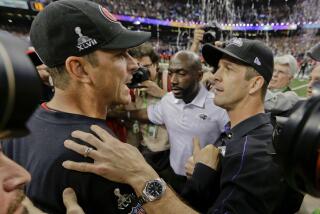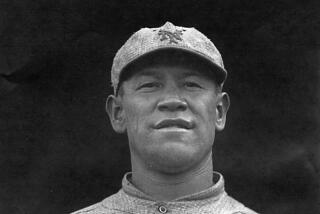BONES OF CONTENTION
- Share via
When Jim Thorpe’s Olympic gold medals were returned to his family in 1983, 70 years after they had been taken from their father, his children wept with joy.
And a happy sports nation wept with them.
Now Jim Thorpe’s children want something else returned: Jim Thorpe.
Five of Thorpe’s children announced at an Oklahoma City news conference Thursday that they want their father’s remains returned from Jim Thorpe, Pa., and buried in a family cemetery at Shawnee, Okla.
How Thorpe’s remains wound up in a small Pennsylvania town once known as Mauch Chunk instead of in his family’s cemetery plot is one of the most bizarre stories in American sports.
Thorpe, arguably the greatest athlete produced in 20th-century America--he won two gold medals at the 1912 Summer Olympics and played baseball in the major leagues and football in what later became the NFL--died at 65 in his trailer home on Pacific Coast Highway in Lomita on March 28, 1953.
His Olympic medals had been taken from him in 1913 when it was learned he’d played semipro baseball in the summer of 1910 for $2 a game.
His widow and third wife, Patricia Askew Thorpe, had the body shipped to Shawnee, Okla., for burial in Garden Grove Cemetery, where numerous Thorpes are buried.
His body was placed temporarily in a mausoleum while a committee was formed to raise funds for a Thorpe tomb.
The Oklahoma Legislature appropriated $25,000 for a tomb, but the measure was vetoed by the governor. At that point, Patricia Thorpe--who was to die in 1974--began searching on her own for a burial site.
She visited Carlisle, Pa., where Thorpe--a Sac and Fox Indian--first gained athletic acclaim as a football player at the Carlisle Indian Institute.
What she was doing, according to those who dealt with her during the period, was trying to sell Thorpe’s body.
“Pat just wanted too much money,” John B. Fowler, a Carlisle civic leader, told Sports Illustrated in 1983. Fowler and a committee had found a burial site, near the football field where Thorpe had played.
Next, Patricia Thorpe unsuccessfully sought to involve the NFL in a burial site.
Then an eastern Pennsylvania town called Mauch Chunk became interested. Located in green mountains 80 miles north of Philadelphia, the picturesque Lehigh River town had long called itself “the Switzerland of America.”
It was a place Thorpe had never visited, his children say, and probably had never heard of.
In 1954, city fathers agreed not only to buy a suitable tomb for Thorpe but also to change the town’s name to Jim Thorpe.
Thorpe’s tomb rests on a mound of earth on a high, grassy park.
The mound is composed of dirt taken from his birthplace, Prague, Okla.; Carlisle; New York’s Polo Grounds, where Thorpe was an outfielder for the Giants, and from the Stockholm Olympic Stadium, where he won gold medals in the decathlon and pentathlon in 1912.
Jim Thorpe had eight children, four each with his first two wives. The six surviving children recently voted, 5-1, to officially ask Jim Thorpe, Pa., to return their father’s remains to Oklahoma.
Thursday, 63-year-old Jack Thorpe and his siblings held a news conference, explaining why they want their father’s body returned to Oklahoma for a proper Indian burial.
“The people of Jim Thorpe, Pennsylvania, are good people and they have always acted in good faith with the family,” Jack Thorpe said.
“We want to give Dad a proper burial. In Indian culture, when someone is not buried with his family, the soul wanders--and that troubles me.”
How could it have happened? How could Thorpe have been buried there?
Jack Thorpe said: “The problem was, Dad never drew up a will. So it was Patsy’s call. And she signed a legally binding contract with the town of Jim Thorpe. We have no proof that it was a commercial transaction--but, well, we’ve always had problems with the way it all happened. You would have had to know Patsy.”
Voting to leave Thorpe’s remains where they are was daughter Grace Thorpe, 79.
“As far as I’m concerned, the city of Jim Thorpe has acted honorably all these years,” she said.
“It would be insulting to ask them to send the remains to Oklahoma. And despite what anyone tells you, Dad was buried properly. He was a Catholic, he was given last rites.
“I’ve always been happy with the way the town has cared for Dad’s grave site. The town has scholarships in Dad’s name, and there’s a ‘Jim Thorpe Day’ parade every year with 1,500 people in it. They have a Jim Thorpe association that honors local athletes every year. The grave site is well maintained.
“Now, would I like him to be buried where he grew up? Of course I would. But it’s just not possible now. Time has passed. I’m uncomfortable with the idea of moving him now.”
Nevertheless, Jack Thorpe said the remaining siblings will pursue their goal and have hired an Oklahoma City attorney, Gary James.
“Our intention is to sit down in good faith with the [Jim Thorpe, Pa.] council,” he said. “Either we’ll work it out--or we’ll go forward legally.”
Jack Kmetz, director of the Jim Thorpe Sports Hall of Fame in Jim Thorpe, Pa., said the town has legal title to Thorpe’s remains.
“Legally, there’s nothing [Thorpe’s children] can do,” he said.
“His widow signed a 1954 document that stipulates neither she nor any heirs can ever remove the body from Jim Thorpe, Pa. It would be a waste of oxygen on their part to challenge anything.
“We feel we’ve taken proper care of the grave site. It sits on three-quarters of an acre and there are cherry trees at the site. The gravestone is a 20-ton block of red granite. And we’re raising money now for a life-size Thorpe statue. We’d put it either at the grave site or downtown.”
More to Read
Go beyond the scoreboard
Get the latest on L.A.'s teams in the daily Sports Report newsletter.
You may occasionally receive promotional content from the Los Angeles Times.










